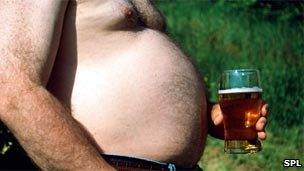How can raising the price of alcohol improve health?
- Published

Drinking too much alcohol on a regular basis increases health risks
Health campaigners say a minimum price for a unit of alcohol should be introduced in the UK to help tackle the nation's rise in problem drinking.
The government in England and Wales is set to announce plans today. Last year the Scottish parliament rejected a similar idea.
What evidence is there to suggest a minimum alcohol price would help?
According to experts, one in four men and women in the UK is currently drinking dangerous amounts of alcohol that are causing, or have the potential to cause, physical and mental damage.
In the UK the number of alcohol-related deaths has more than doubled in the past 16 years, with more than 8,000 people dying of conditions such as alcohol poisoning and liver cirrhosis every year.
And it costs the NHS over £2bn annually to treat the chronic and acute affects of alcohol.
Campaigners argue that part of the problem is down to the wide availability of cheap booze in supermarkets and other retail outlets.
England's last Labour government asked economic experts to do some number crunching to work out if introducing a minimum price would help to curb the nation's drinking.
Researchers at the University of Sheffield, externaltook on the challenge and looked at how high to set the bar per unit (10ml or 8g) of alcohol.
As expected, they found the higher the price tag went, the greater the reduction in consumption would be.
But they were concerned that if the price was set too high it would penalise all drinkers, including so-called "sensible" drinkers. Conversely, setting it too low would do nothing to stop heavy drinkers loading up on strong "bargain" booze.
The government in England and Wales is looking at introducing a minimum price of 21p per unit for beer and 28p per unit for spirits.
But the the University of Sheffield experts calculate that a minimum cost of at least 50p per unit would be necessary achieve the desired effect.
Not far enough
Professor Petra Meier, a public health expert at the university, said: "It's certainly true that the bigger the price change the bigger the effect.
"Effects of 20p-30p are very modest compared to 45p-50p per unit.
"Alcohol-related harm is driven through consumption and we don't really predict that people's consumption would change at all under 20p minimum price and very modestly under 30p."
Setting the bar at 50p should save up to 50,000 people from illness in a decade, Professor Meier and colleagues estimate.
They say harmful drinkers would be affected considerably more than moderate drinkers by this minimum price policy.
For a 50p minimum price, a harmful drinker will spend on average an extra £163 per year whilst the equivalent spending increase for a moderate drinker is £12.
This would reduce levels of alcohol consumption by 10.3% among harmful drinkers - those who drink above the recommended limit of 4 units per day for men or 3 units per day for women.
It would also have a big impact on the health of moderate drinkers - men drinking three bottles of wine or 21 or fewer units per week, and women drinking a bottle and a half of wine or 14 units or fewer.
And in terms of the overall burden of alcohol-related ill health, about 20% is for moderate drinkers who make up half of the population.
A 50p limit should cut alcohol consumption among moderate drinkers by about 3.5%, or half a unit for women and two-thirds of a unit for men.
Although this may not sound much, the researchers say it equates to big health gains with time.
It would slash rates of high blood pressure, diabetes and heart disease.
Their calculations show a 50p limit would mean 2,900 fewer premature deaths a year as well as 41,000 fewer cases of chronic illness.
It would also mean 8,000 fewer injuries each year, 92,000 fewer hospital admissions per year and a saving to the healthcare system in England of £270 million each year.
- Published18 January 2011